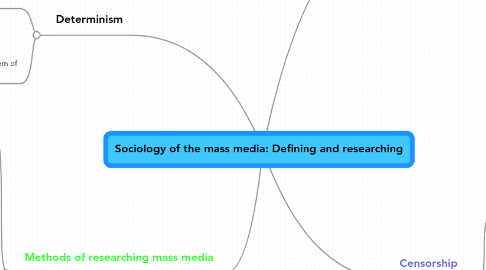
1. Determinism
1.1. Power and influence of media widely debated
1.1.1. Some say beneficial - informative, entertaining, diversity of media, educating
1.1.2. Some say negative - audience uncritically receives message transmitted
1.2. Definition: sees human behaviour as a fixed consequence of events/experiences, no freedom of choice
1.2.1. Determinists agree with this - media influences decisions made and therefore lifestyle
1.2.1.1. McLuhan (1964) - "media determinism" - media's influence on social change. Believes that widespread and ever-changing use of media has fundamental effect on people's experience of life, society and the world
2. Methods of researching mass media
2.1. Content analysis
2.1.1. Analyse content of media products, normally to quantify particular aspect of media content to count/measure it
2.1.1.1. Lobban (1974) and Best (1993) - examined gender representations in children's reading schemes by counting numbers in particular categories e.g. heroines/heroes
2.1.2. Criticisms
2.1.2.1. Problems with secondary data (e.g. bias or errors)
2.1.2.2. Doesn't explain effect on audience of the content
2.1.2.3. Producer's intentions are not explored
2.1.2.4. Issues with validity
2.2. Semiology
2.2.1. Analysing meaning of signs/codes within cultural context - to uncover what ideology they are conveying
2.2.2. Used by feminists to analyse messages related to gender role ideology
2.2.3. Some say scientific research, but findings are open to interpretation so qualitative
2.3. Experiments
2.3.1. Using methods of natural scientists (controlling variables in a lab), although sociologists use "field experiments" (in a natural social environment)
2.3.2. More likely to be used to research media and manipulate variables to examine influence
2.3.3. Problems
2.3.3.1. Ethical issues - effects on participants
2.3.3.2. Artificial environment - lacks validity
2.3.3.3. Hawthorne Effect
3. Defining mass media
3.1. '20s and '30s definition - straight forward: "ways of communicating to large audiences"
3.2. Nowadays more complex as range, role & scope of media has developed
3.2.1. More media (e.g. mobile phones, internet etc.)
3.2.2. Info is able to circle around the world, McLuhan (2002) - "global village"
3.2.3. McCullagh (2002) - "the mass media are simply the means through which content, whether fact or fiction, is produced by organisations and transmitted to and received by an audience"
3.3. Devereux (2008) - key aspects for more detailed understanding of mass media's role
3.3.1. > communications between senders and receivers
3.3.2. > texts as cultural products with social, cultural and political significance
3.3.3. > mass media as industries/organisations
3.3.4. > m.m as agents of social change and globalisation
3.3.5. > texts as commodities prod. by media industries
3.3.6. > m.m as agents of socialisation and powerful sources of social meaning
4. Censorship
4.1. Definition: controlling/regulating media, stopping material reaching certain audiences or restricting audiences being reached
4.1.1. E.g. Gov. - Official Secrets Act and DA Notices (official requests not to publish an item) - to stop info of a certain event being leaked, therefore damaging national security
4.1.2. E.g. Regulatory bodies - aka "watchdogs" e.g. Press Complaints Commission check security
4.1.3. E.g. Watershed - tv restrictions to stop younger audiences reaching unsuitable programmes/adverts
4.2. Formal - official bodies e.g. gov.
4.3. Informal - media professionals mutually agreeing
4.4. Disputed: should media be censored?
4.4.1. Yes, media influences majority, protects vulnerable people
4.4.2. No, media has no influence. Free choice unless proven harmful
